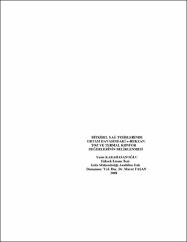| dc.contributor.author | Karahasanoğlu, Yasin | |
| dc.date.accessioned | 2017-04-21T07:45:53Z | |
| dc.date.available | 2017-04-21T07:45:53Z | |
| dc.date.issued | 2008 | |
| dc.identifier.uri | https://hdl.handle.net/20.500.11776/303 | |
| dc.description.abstract | Bu arastırmada bitkisel yag tesislerinde ortam havasındaki n-hekzan, toz ve termal konfor degerleri belirlenmistir. Ayrıca bu degerlerin isçi ve çevre saglıgı limit degerleri ile karsılastırılması yapılmıstır. Çalısmada, çözücü (n-hekzan) ekstraksiyon yöntemi ile ham yag üretimi gerçeklestiren 5 orta ölçekli tesis seçilmistir. Bu tesislerden 2‘sinde aynı zamanda kimyasal rafinasyon yöntemi kullanılarak rafine yag üretimi de yapılmaktadır. Örnekleme islemini uygulayabilmek amacıyla tesis içerisinde ve dısarısında farklı konumlar belirlenmistir. Örnekleme islemleri, tesislerin tam kapasitede faaliyet gösterdikleri süre içerisinde yapılmıstır. Elde edilen sonuçlar ortam havasındaki n-hekzan degerlerinin yasal limitin çok altında oldugunu göstermektedir. Ayrıca, toz degerlerinin çalısma kosullarına uygun oldugu ve sıcaklık degerlerinin de isyeri ortamı klima kosulları kriterleri arasında bulundugu tespit edilmistir. Bu tip isletmelerde söz konusu analizlerin sürekliligi saglanmalı, isçi ve çevre saglıgını etkileyebilecek olan risklerin önceden tespit edilerek herhangi bir olumsuz durum olusmadan engellenmesi gerekmektedir. | en_US |
| dc.description.abstract | The objective of this study was to determine the ambient air n-hexane, particle matter and thermal comfort values of selected vegetable oil plants. The obtained results were compared with the national regulations pertaining to employee and environmental health. In the work, totally five vegetable oil companies which are used continuous solvent extraction with nhexane processes. Also, two of these companies are used chemical refining method for production of refined vegetable oils. Different locations inside and outside vegetable oil plants were determined to apply the sampling. The sampling was made when the vegetable oil companies reached to full production capacities. According to the analyses results, the values of ambient air n-hexane and particle matter were below the legal limits for employee and environmental health protection. The thermal comfort values were between workplace climate condition legal limits. In such plants, continuity of these analyses should be maintained, the risks that may affect the employee and environmental health should be fixed initially and they should be prevented before any negation that may happen. | en_US |
| dc.language.iso | tur | en_US |
| dc.publisher | Namık Kemal Üniversitesi | en_US |
| dc.rights | info:eu-repo/semantics/openAccess | en_US |
| dc.subject | n-hekzan | en_US |
| dc.subject | toz | en_US |
| dc.subject | sıcaklık | en_US |
| dc.subject | çözücü ekstraksiyon | en_US |
| dc.subject | rafinasyon tesisi | en_US |
| dc.subject | n-hexane | en_US |
| dc.subject | particle matter | en_US |
| dc.subject | temperature | en_US |
| dc.subject | solvent extraction | en_US |
| dc.subject | refining plant | en_US |
| dc.title | Bitkisel yağ tesislerinde ortam havasındaki n-hekzan, toz ve termal konfor değerlerinin belirlenmesi | en_US |
| dc.title.alternative | Determination of the values ambient air n-hexane, particle matter and thermal comfort in vegetal oil units | en_US |
| dc.type | masterThesis | en_US |
| dc.department | Enstitüler, Fen Bilimleri Enstitüsü, Gıda Mühendisliği Ana Bilim Dalı | en_US |
| dc.relation.publicationcategory | Tez | en_US |



















